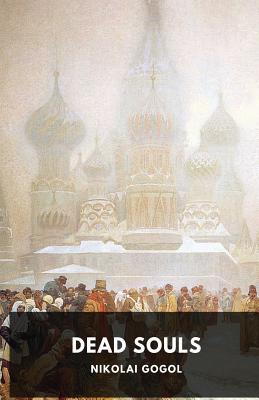In early nineteenth century Russia, one’s status is decided based on how many enslaved workers (serfs) under your name. Likewise, property owners do not pay taxes on the land own but rather on the number of serfs assigned to them at the last census. Even if a serf dies, a property owner must pay taxes on him or her until the next census rights it. In Dead Souls, Chichikov is an up-and-coming middle class man who has cleverly decided on a get rich quick scheme: buy dead serfs (called “souls”) from property owners to use as collateral in purchasing things for himself.
Dead Souls by Nikolai Gogol (published 1842) is a complex satire. And yet, supposedly Gogol did not intend it to be a satire. In all seriousness, he wrote that this part of the novel (part 1 was the only part he completed; part 2 was unfinished and part 3 never begun) was representative of Dante’s Inferno. This is, to me, a stretch, but I can see it. With the humor in the text, however, I saw Dead Souls as far more than a look at the depredation of man’s soul in post 1812 Russia. I saw it as an amusing satire of Russian society in general.
Obviously, if Gogol is writing about the dark side of man’s soul, then the title seems appropriate for a second reason: he’s writing about the variety of “dead souls” in society. Each of the landowners that Chichikov encounters is a different type of “dead.” As my book group and I decided, the property owners Chichikov encounters almost directly correlate to the seven deadly sins (wait a second while I go look them up):
- Korobochka is greed. She wants to make sure she gets her money for her dead souls. She is also ignorance, but that is not one of the deadly sins. Good thing, because then the world would be in trouble.
- Sobakevich is gluttony. He eats a whole pig at dinner. And then calls in the desert.
- Nozdryov is wrath. He angers about everything and even tries to fight Chichikov. His name means “nose.”
- Plyushkin is sloth. His house is in disorder and he pinches pennies far too much.
- Manilov is much more difficult to place. A few sites I looked at suggest that his scene is a homosexual component of the novel (Chichikov is a homosexual, apparently). This was not overtly obvious to me, but Manilov could be lust. His name means “to allure, to attract.” He is Chichikov’s first property owner he approaches about purchasing dead souls.
Chichikov himself is envy and pride. His first steps on coming in to the town were to figure out who was important and who had property. He flattered the important people. His name means “little bird twittering” or maybe “achooo” like a sneeze. What a ridiculous man. And yet, even though it is a bit exaggerated, he still seems like an everyman. In terms of capturing the essence of sinful people (those with “dead souls”), Gogol has succeeded, I think.
Supposedly, his efforts at bringing Chichikov to justice in Purgatorio-like and Paradiso-like sequels never came to much. I did not read the incomplete volume 2. But apparently Gogol did too well at making Chichikov sinful in this first volume. He couldn’t redeem him.
I haven’t even begun to discuss the humor in this book. I think it’s simply great. I read Peavear and Volokohnsky’s translation for the most part, and it was so easy and delightful to read. Dead Souls has a lot going on. While I wouldn’t say it is a page-turner, the subtle humor and picaresque scenes are well worth reading. It is a fine Russian novel, and one I would enjoy revisiting some day. There’s much more underneath the surface.
Have you read Dead Souls?




I really have to read this one; I recently purchased it, so at least it is now sitting on the shelves.
I read this last year and really enjoyed it–it’s pretty hilarious. Great review!
I haven’t read this one yet. Actually Gogol is the only main 19th century Russian author I haven’t read. But Dead Souls is definitely on my TBR list. Thanks for your review!
A great book, and funny whether the writer intended it or not 🙂 His short stories are great too.
Don,t recall the great humor, but the glazed homosexual content is present.